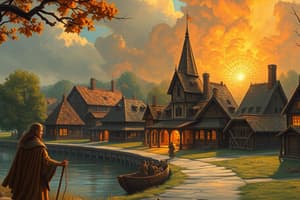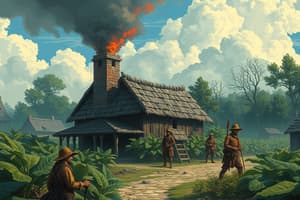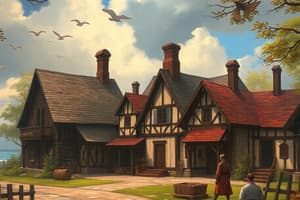Podcast
Questions and Answers
What was the impact of the Treaty of Guadalupe Hidalgo?
What was the impact of the Treaty of Guadalupe Hidalgo?
It ended the war with Mexico, gave the US the Mexican Cession, and involved the US paying $15 million to Mexico.
What was the Erie Canal?
What was the Erie Canal?
A canal linking Lake Erie to the Hudson River in New York.
What was the impact of the Erie Canal?
What was the impact of the Erie Canal?
It made shipping goods cheaper and easier, making NYC a center of commerce.
What was the Indian Removal Act of 1830?
What was the Indian Removal Act of 1830?
What was the Trail of Tears?
What was the Trail of Tears?
What was Worcester v. Georgia?
What was Worcester v. Georgia?
What was the focus of Andrew Jackson's Presidency?
What was the focus of Andrew Jackson's Presidency?
What is the Spoils System?
What is the Spoils System?
What was the Homestead Act?
What was the Homestead Act?
What was the Transcontinental Railroad?
What was the Transcontinental Railroad?
What was the Gold Rush in California?
What was the Gold Rush in California?
What was a significant impact of the Gold Rush?
What was a significant impact of the Gold Rush?
What was Nat Turner's Rebellion?
What was Nat Turner's Rebellion?
Who was Sojourner Truth?
Who was Sojourner Truth?
Who was William Lloyd Garrison?
Who was William Lloyd Garrison?
Who was Frederick Douglass?
Who was Frederick Douglass?
What is Harriet Beecher Stowe known for?
What is Harriet Beecher Stowe known for?
Who were the Grimke Sisters?
Who were the Grimke Sisters?
What was Elizabeth Cady Stanton's role in the women's rights movement?
What was Elizabeth Cady Stanton's role in the women's rights movement?
What was the Seneca Falls Convention?
What was the Seneca Falls Convention?
What does the Declaration of Sentiments represent?
What does the Declaration of Sentiments represent?
What is sectionalism?
What is sectionalism?
What was Jamestown known for?
What was Jamestown known for?
What is a plantation?
What is a plantation?
Which colony became a major Puritan colony?
Which colony became a major Puritan colony?
The Puritans came to America primarily for religious freedom.
The Puritans came to America primarily for religious freedom.
What did New Amsterdam become after being captured?
What did New Amsterdam become after being captured?
What are some geographic features of New England?
What are some geographic features of New England?
What type of climate is typical for the Southern colonies?
What type of climate is typical for the Southern colonies?
What is indentured servitude?
What is indentured servitude?
What economic policy was mercantilism?
What economic policy was mercantilism?
The Navigation Acts angered colonists as they restricted trade.
The Navigation Acts angered colonists as they restricted trade.
What does the term 'Salutary Neglect' refer to?
What does the term 'Salutary Neglect' refer to?
What was the Mayflower Compact?
What was the Mayflower Compact?
What was the House of Burgesses?
What was the House of Burgesses?
The first African slaves arrived in America in 1619.
The first African slaves arrived in America in 1619.
What was the main conflict in the French and Indian War?
What was the main conflict in the French and Indian War?
What were the effects of the French and Indian War?
What were the effects of the French and Indian War?
What was 'Join or Die'?
What was 'Join or Die'?
What was the Stamp Act?
What was the Stamp Act?
What did the phrase 'No taxation without representation' reflect?
What did the phrase 'No taxation without representation' reflect?
Who were the Sons of Liberty?
Who were the Sons of Liberty?
What was the Boston Tea Party?
What was the Boston Tea Party?
What did the First Continental Congress achieve?
What did the First Continental Congress achieve?
What did the Second Continental Congress do?
What did the Second Continental Congress do?
What is the Declaration of Independence?
What is the Declaration of Independence?
What are unalienable rights?
What are unalienable rights?
What is a social contract?
What is a social contract?
What is the consent of the governed?
What is the consent of the governed?
Who was John Locke?
Who was John Locke?
What did Thomas Jefferson do?
What did Thomas Jefferson do?
What were the Articles of Confederation?
What were the Articles of Confederation?
What was Shay's Rebellion?
What was Shay's Rebellion?
What did the Northwest Ordinance of 1787 achieve?
What did the Northwest Ordinance of 1787 achieve?
What was the Constitutional Convention?
What was the Constitutional Convention?
What is the U.S. Constitution?
What is the U.S. Constitution?
What was the Great Compromise?
What was the Great Compromise?
What did Federalists believe?
What did Federalists believe?
The Bill of Rights consists of the first ten amendments to the Constitution.
The Bill of Rights consists of the first ten amendments to the Constitution.
What is limited government?
What is limited government?
What is the separation of powers?
What is the separation of powers?
What are checks and balances?
What are checks and balances?
What is the Elastic Clause?
What is the Elastic Clause?
What is federalism?
What is federalism?
What was the Three-Fifths Compromise?
What was the Three-Fifths Compromise?
What is a veto?
What is a veto?
What is an amendment?
What is an amendment?
What is the Electoral College?
What is the Electoral College?
What are the Federalist Papers?
What are the Federalist Papers?
What did Brutus (Anti-Federalist) Papers address?
What did Brutus (Anti-Federalist) Papers address?
Who was George Washington?
Who was George Washington?
What was Washington's Farewell Address?
What was Washington's Farewell Address?
What does foreign policy refer to?
What does foreign policy refer to?
What is isolationism?
What is isolationism?
What are Washington's precedents?
What are Washington's precedents?
What was the National Bank?
What was the National Bank?
What is strict construction?
What is strict construction?
What is loose interpretation of the Constitution?
What is loose interpretation of the Constitution?
What were the first political parties?
What were the first political parties?
What is the Unwritten Constitution?
What is the Unwritten Constitution?
What is judicial review?
What is judicial review?
What was McCulloch v. Maryland?
What was McCulloch v. Maryland?
What was the Marshall Court known for?
What was the Marshall Court known for?
What was Gibbons v. Ogden?
What was Gibbons v. Ogden?
What is the President's Cabinet?
What is the President's Cabinet?
What was the Boston Massacre?
What was the Boston Massacre?
What was Common Sense?
What was Common Sense?
What is westward expansion?
What is westward expansion?
What does Manifest Destiny refer to?
What does Manifest Destiny refer to?
What was the Louisiana Purchase?
What was the Louisiana Purchase?
What was the War of 1812?
What was the War of 1812?
What were the causes of the War of 1812?
What were the causes of the War of 1812?
What was the impact of the War of 1812?
What was the impact of the War of 1812?
What is nationalism?
What is nationalism?
What was the Monroe Doctrine?
What was the Monroe Doctrine?
What was Texas Annexation?
What was Texas Annexation?
What was the Mexican-American War?
What was the Mexican-American War?
What is the Mexican Cession?
What is the Mexican Cession?
Flashcards are hidden until you start studying
Study Notes
Early Colonization
- Jamestown, established in 1607, was the first permanent English settlement in Virginia, marked by hardships such as disease and starvation.
- Puritans settled in Massachusetts Bay Colony in 1630, seeking religious freedom and establishing a major trading center, including Boston.
- Indentured servitude became a labor system where workers agreed to work for several years in exchange for passage to America, primarily involving Europeans initially, then Asians later.
Economic Policies & Colonial Relations
- Mercantilism aimed for nations to increase wealth through trade and resources, establishing trade regulations via Navigation Acts.
- Salutary neglect allowed colonies some autonomy while maintaining economic loyalty toward England, fueling resentment later.
- Taxes imposed by Britain, like the Stamp Act, Tea Act, and Sugar Act, spurred the phrase "no taxation without representation," igniting colonial frustrations.
Revolutionary Ideas & Events
- The First and Second Continental Congresses established a collective response to British policies leading up to the Declaration of Independence in 1776, which emphasized unalienable rights of life, liberty, and the pursuit of happiness.
- Key protests like the Boston Tea Party showcased colonial resistance against British taxation.
- The Sons of Liberty emerged as a radical group advocating for independence, led by figures such as Samuel Adams.
Formation of Government
- The Articles of Confederation (1781-1788) created a weak federal government lacking executive and judicial power, highlighting the need for a more robust national framework.
- Shay's Rebellion revealed weaknesses in the Articles, leading to the Constitutional Convention in 1787 where the U.S. Constitution was drafted.
- The Great Compromise balanced representation in Congress, while debates between Federalists and Anti-Federalists resulted in the adoption of the Bill of Rights.
Influential Figures & Doctrines
- Thomas Jefferson, the principal author of the Declaration of Independence, embodied the struggle between federal authority and states' rights.
- John Locke's philosophy on natural rights influenced revolutionary thinkers, emphasizing consent of the governed.
- The Monroe Doctrine (1823) established U.S. opposition to European colonialism in the Americas.
Expansion and Conflict
- Manifest Destiny in the 1800s underscored the belief in American expansion across the continent, leading to events such as the Louisiana Purchase in 1803.
- The Mexican-American War (1846-1848) resulted from territorial tensions post-Texas Annexation, with significant land gains under the Treaty of Guadalupe Hidalgo exacerbating the slavery debate.
- The Indian Removal Act of 1830 forced Native Americans westward, culminating in the harrowing Trail of Tears.
Key Constitutional Concepts
- Separation of powers distributed governmental authority among legislative, executive, and judicial branches, reinforced by checks and balances.
- The elastic clause allows Congress to pass necessary laws beyond those explicitly stated in the Constitution.
- Judicial Review, established in Marbury v. Madison (1803), affirmed the Supreme Court's ability to invalidate legislative acts contrary to the Constitution.
Economic Transformations
- The construction of the Erie Canal in 1825 lowered shipping costs, bolstering commerce and connecting the Midwest to eastern markets.
- The National Bank proposed by Hamilton aimed to stabilize the economy but faced opposition from Jefferson and other Democratic-Republicans concerned about federal overreach.
Legacy of Leadership
- George Washington's presidency set precedents including the formation of a cabinet and warnings against foreign alliances and political factions in his farewell address.
- Political parties emerged from ideological divisions surrounding government power, leading to the first significant party system in U.S. history.
These notes encapsulate key events, concepts, and figures from early American history, focusing on critical developments that shaped the nation.### Georgia (1832)
- Supreme Court ruling affirming state limitations on jurisdiction over lands not owned by the state.
- John Marshall stated Georgia could not remove Native Americans from their lands.
- Andrew Jackson largely ignored this ruling, showcasing tensions between federal authority and state actions.
Andrew Jackson's Presidency
- Presidency focused on representing the "Common Man" from 1828 to 1836.
- Key actions included the Indian removal policies and frequent use of veto power.
- Implemented the spoils system, rewarding party loyalists with public positions.
- Oversaw the annexation of new territories, reshaping the nation's landscape.
Spoils System
- Public employment practice rewarding loyal party members and friends rather than based on merit.
- Promoted favoritism in government positions.
Homestead Act (1862)
- Legislation providing free land in the western US to settlers.
- Encouraged migration and settlement in the West, facilitating development.
Transcontinental Railroad
- Railroad that linked the eastern and western coasts of the United States.
- Played a crucial role in unifying the nation and facilitating commerce.
Gold Rush in California
- Gold discovery in 1848 led to a mass migration to California.
- Approximately 34,000 people moved to San Francisco, representing diverse ethnic backgrounds, including many Asians.
Impact of the Gold Rush
- Resulted in significant wealth creation for California and importance as a major port.
- Fueled the construction of a transcontinental railroad.
- Elevated the US to a global trade leader, but led to devastation of Native populations.
- Increased racial tensions, adversely affecting Chinese and Mexican workers.
Nat Turner's Rebellion (1831)
- Slave uprising in Virginia resulting in 60 white deaths.
- Heightened fears of slavery-related revolts among Southern whites.
- Prompted legislation prohibiting education for slaves and free black individuals.
Sojourner Truth
- Renowned abolitionist and feminist, formerly enslaved, advocating for abolition and women's rights (1797-1883).
William Lloyd Garrison
- Influential abolitionist and journalist, known for editing "The Liberator."
- Co-founder of the American Anti-Slavery Society, promoting end of slavery.
Frederick Douglass
- Escaped slave and prominent abolitionist advocating for the political end of slavery.
Harriet Beecher Stowe
- Author of "Uncle Tom's Cabin," a significant anti-slavery novel.
- Played a pivotal role in raising awareness about the moral issues surrounding slavery.
Grimke Sisters
- Angelina and Sarah Grimke actively campaigned for prison reform, temperance, and abolition of slavery.
Lucretia Mott
- Quaker women's rights advocate with strong support for the abolition of slavery.
Elizabeth Cady Stanton
- Prominent figure in the women's rights movement, shocked contemporaries by advocating for women's suffrage at the 1848 Seneca Falls Convention.
- Authored the "Declaration of Sentiments," which called for gender equality.
Seneca Falls Convention (1848)
- First national convention focused on women’s rights.
- Birthplace of the "Declaration of Sentiments," crucial for the women's rights movement.
Declaration of Sentiments
- Modified version of the Declaration of Independence to include women's rights.
- Essential document advocating for civil, social, political, and religious rights for women.
Sectionalism
- Development of distinct and separate cultural identities in different regions (North, South, West).
- Potential to create conflicts based on differing regional interests and values.
Studying That Suits You
Use AI to generate personalized quizzes and flashcards to suit your learning preferences.




